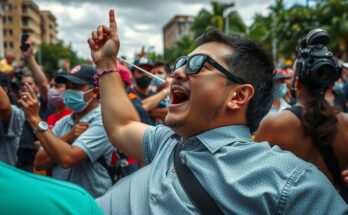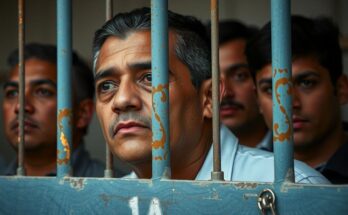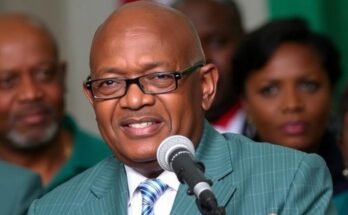Mozambique’s upcoming election marks the end of an era dominated by independence-era leaders, as Daniel Chapo, a post-independence candidate from Frelimo, faces tough competition from independent Venâncio Mondlane and Ossufo Momade of Renamo. Allegations of voter fraud complicate the democratic process, raising doubts about the integrity of the election amidst ongoing economic challenges.
Mozambique is approaching a crucial election, marking a significant transition as it ends an era dominated by leaders rooted in the independence struggle against Portuguese colonial rule. For the first time, the Frelimo party will nominate a presidential candidate born post-independence: the dynamic 47-year-old Daniel Chapo, who the party hopes will attract disenchanted voters weary of its nearly half-century governance. Political analyst Charles Mangwiro highlighted a notable increase in public dissent at Frelimo’s rallies, suggesting an erosion of the party’s longstanding dominance. With President Filipe Nyusi concluding his tenure after two terms, Chapo faces considerable electoral challenges. His campaign comes amid the backdrop of the controversial tuna bond scandal that exacerbated an economic crisis, raising questions about the party’s integrity. Despite these issues, Chapo presents himself as a refreshing alternative, eschewing Frelimo’s historical corruption. His supporters express hope, as reflected in the lyrics of his campaign song: “Brother Dan is honesty in person… He is the voice of hope we want to embrace… It’s time for change.” However, skepticism persists regarding Chapo’s ability to enact substantial reforms. Journalist and activist Mirna Chitsungo remarked on the inherent contradiction of a candidate promising to combat corruption while representing a party with a legacy marked by such issues. Chapo’s political trajectory has been relatively rapid; he ascended to Frelimo’s general secretary in 2023 after having served in various governmental roles since 2011. Nonetheless, allegations of electoral impropriety cast a shadow over the election process. The Centro de Integridade Pública has raised concerns about approximately 900,000 voters on the register being fictitious or “ghost voters.” These irregularities disproportionately affect Frelimo’s traditional strongholds, with Joe Hanlon, a Mozambique expert, noting discrepancies in voter registration that threaten the electoral process’s legitimacy. Chapo faces stiff competition from three contenders: Venâncio Mondlane, an independent candidate; Ossufo Momade of Renamo; and Lutero Simango from the Democratic Movement of Mozambique (MDM). Particularly noteworthy is Mondlane, who has rapidly gained popularity with younger voters. His campaign under the slogan “Save Mozambique – this country is ours” resonates with aspirations for national pride and improved living conditions. Despite formerly being aligned with Renamo, Mondlane’s emergence poses a challenge to both Chapo and Momade, particularly as he cultivates a following reminiscent of the late Renamo leader Afonso Dhlakama. Momade, who previously signed a peace agreement with Nyusi, also aspires to lead while aiming to uphold the integrity of their peace deal amidst allegations of electoral malfeasance. The elections will be held against the backdrop of ongoing violence in Cabo Delgado province, where insurgent activity has directly impacted the lucrative gas projects crucial to Mozambique’s economic future. Despite this instability, experts agree the most pressing issue for the newly elected leader will be to address poverty, as approximately 62% of the population survives on less than $1.90 per day. As the political landscape shifts ahead of the election, final rallies are taking place, but Mangwiro cautions against making predictions: “It is too close to call.”
Mozambique is at a pivotal moment in its democratic journey, transitioning from decades of rule by leaders with ties to the nation’s independence struggle. With the Frelimo party nominating Daniel Chapo, a candidate born after the country’s 1975 independence, the elections present an opportunity for potential reform and change. As Mozambique copes with economic challenges and historical corruption, the electoral landscape is further complicated by rising opposition and concerns regarding voter registration integrity, underscoring the complexity of this electoral cycle.
In summary, Mozambique’s upcoming elections represent a critical juncture for the nation, as Daniel Chapo seeks to revitalize Frelimo’s image while contending with accusations of corruption and electoral manipulation. His primary opponents, Venâncio Mondlane and Ossufo Momade, reflect a burgeoning desire among voters for authentic change. As the electorate prepares to cast its votes amid economic hardship and persistent violence, the results of the election could signal a significant shift in the fabric of Mozambique’s political landscape.
Original Source: www.bbc.com




